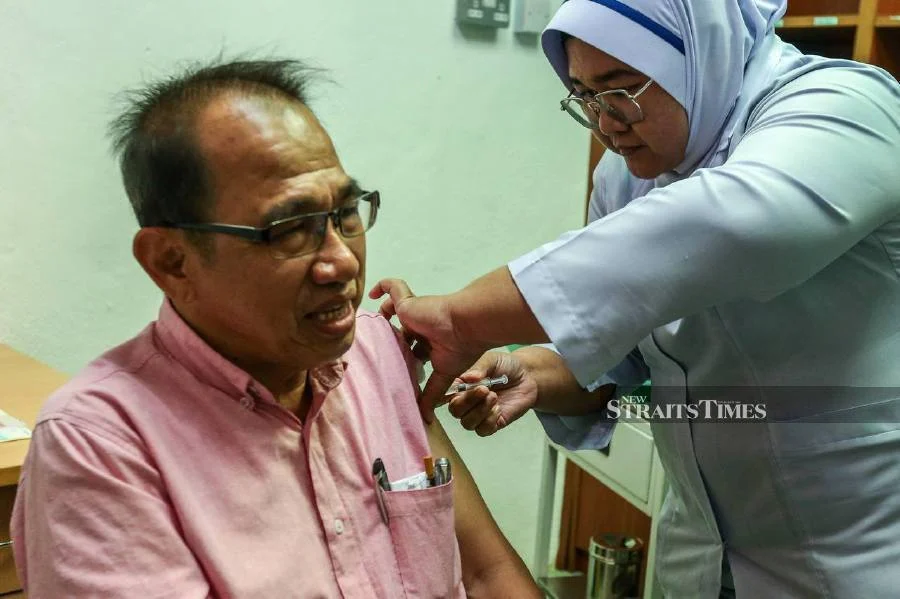Pneumonia can be a potentially life-threatening infection, especially for vulnerable groups, and a cough is one of its common symptoms.
People who have pneumonia tend to have a productive cough, i.e. one that produces mucus or phelgm. — dpa
Coughs and colds are rife this time of year, but how can you tell when they might be a sign of something more serious, like pneumonia?
Recognising the difference between an ordinary cough and a potentially dangerous lung infection can play a crucial role in ensuring timely treatment and a smooth recovery.
To help clarify the signs, we spoke to British consultant general practitioner (GP) Dr Claire Agathou, who explained exactly what pneumonia is, what its key symptoms are, and when to seek medical advice.
“Pneumonia is an infection of the lungs which causes inflammation in the tiny air sacs in the lungs, which are called alveoli, which then fill with fluid or pus,” Dr Agathou explains.
“This makes it much harder for oxygen to pass into the bloodstream, which leads to coughing, breathlessness and fever.
“It can affect just one lung, or sometimes both, and ranges from mild to life-threatening.”
According to British charity Asthma + Lung UK, there were 518,525 hospital admissions for pneumonia alone in England last year and almost a fifth of these patients were readmitted again after 30 days
“Pneumonia is most often caused by bacteria called Streptococcus pneumoniae, but viruses, and less commonly, fungi, can also trigger it.
“We often call this an atypical pneumonia,” says Dr Agathou.
“Pneumonia can develop after a viral illness like a flu when the immune system is really run down or when bacteria is inhaled into the lungs.”
“Typically, a more viral or an allergic cough tends to be on the drier side.
“Sometimes, if it’s viral, it’s also linked to a sore throat or feeling a bit congested, and usually improves itself after a week or two,” she says.
However, Dr Agathou highlights that pneumonia coughs are typically “productive”, i.e. bring up mucus or phlegm.
“If you’re bringing up green, yellow or rusty-coloured phlegm, start to feel very feverish and experiencing any breathlessness, those would be the sort of things that would start to make you think it might be pneumonia,” she says.
“You will generally feel more unwell and weak with a pneumonia than you would with a simple cold or hay fever-like symptoms if it was allergy-related.”
“Another big thing to look out for is chest pain, or pain when breathing in,” highlights Dr Agathou.
“Another common symptom that we see, particularly in older adults, is confusion.
“In addition, when you’ve got pneumonia, you may pass much less urine and tend to be dehydrated, so these are some other things to look out for.”
“It is possible for anyone to develop pneumonia and many healthy adults recover well with antibiotics,” says Dr Agathou.
“However, the rates are much higher in vulnerable communities, so, in the elderly or people with reduced immune function or respiratory conditions.
“It’s really important that babies, the elderly or those with chronic conditions, weaker immune systems or respiratory conditions displaying symptoms are seen to very promptly.”
“If you’ve got a cough that’s just lingering and persisting after five to seven days, you should be seen by a doctor,” she advises.
“But, irrespective of time frame, if you have a really severe cough, feel really unwell and start to feel that your breathing is off the norm, then I would get checked out very quickly by a GP.
“If there is a pneumonia there, we want to treat it as soon as possible when it’s mild, to prevent you from getting much worse.”
“When you go to a GP, we check your oxygen levels, your breathing rate, your temperature, your pulse and all of these things that can indicate to us how severe the infection is,” explains Dr Agathou.
“We also listen to your chest to see if we can hear anything unusual and if we are very concerned, we can organise an X-ray.”
“If it’s a typical pneumonia, antibiotics and fluids are the primary sources of management,” she says.
“Oral antibiotics are usually prescribed, provided that the person is able, is not vomiting, and is in a suitable condition to be managed at home.
“However, the most severe cases need hospital care, oxygen support and fluid.”
“In the colder months, our immune systems are working harder because of the stress from a cold response, and also because infections tend to spread more,” says Dr Agathou.
“We also know that flu is more common in the winter months, and when people have flu or viruses, it means their immune systems can be weaker and that’s why you’re more susceptible to getting pneumonia.”
“It is all about making sure that your immune system is kept as strong as possible,” she says.
“For example, doing things that can help us fight infection better, like making sure you’re dressed warmly and taking multivitamins.
“In addition, if you are eligible for the flu and/or Covid-19 vaccine, you should consider having these.” – By Camilla Foster/PA Media/dpa







